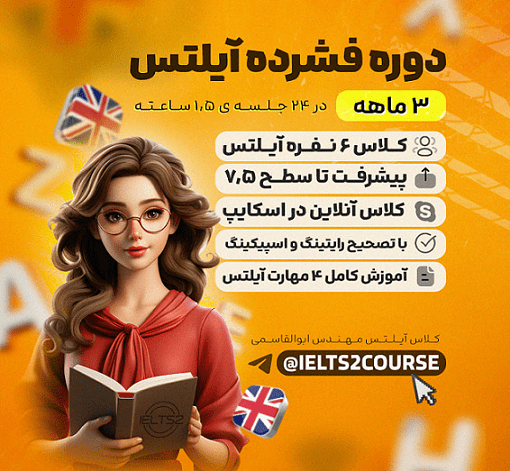20 موضوع رایتینگ انگلیسی برای سطح متوسط + جواب
Writing Topics for Intermediate Students
در اینجا 20 موضوع رایتینگ برای سطح متوسط را به همراه پاسخ های 100 کلمه ای برای شما عزیزان گردآوری کرده ایم. رایتینگ یا نوشتن یکی از مهارتهای کلیدی در یادگیری زبان انگلیسی است که به تمرین و آشنایی با ساختارها و واژگان متنوع نیاز دارد. برای زبانآموزانی که در سطح متوسط هستند، یادگیری مهارتهای نوشتاری بسیار مهم است زیرا این سطح، مرحلهای کلیدی در یادگیری زبان به شمار میرود. در این مقاله، به بررسی اهمیت رایتینگ، ارائه موضوعات مفید، و نکاتی عملی برای بهبود مهارت نوشتاری در سطح متوسط پرداخته میشود. همچنین، پاسخهایی نمونه برای هر موضوع ارائه میشود تا به زبانآموزان کمک کند که با ایدهها و ساختارهای مناسب آشنا شوند. 100 موضوع رایتینگ برای سطح مبتدی (با نمونه جواب) پیشنهاد بعدی ما به شما عزیزان است.
اهمیت رایتینگ در سطح متوسط
سطح متوسط، سطحی است که در آن زبانآموزان باید بتوانند ایدههای خود را به شکلی واضح و سازمانیافته بیان کنند. مهارت رایتینگ به آنها این امکان را میدهد که دایره واژگان خود را گسترش دهند، ساختارهای گرامری را تمرین کنند، و تواناییهای خود را در بیان ایدهها بهبود بخشند. علاوه بر این، نوشتن به افزایش دقت در یادگیری کمک میکند و باعث میشود زبانآموزان اشتباهات خود را شناسایی و تصحیح کنند. تمرین با 20 موضوع رایتینگ سطح متوسط در بخش بعد گام اول برای تقویت این مهارت است.
موضوعات پیشنهادی برای رایتینگ سطح متوسط
در اینجا 20 موضوع رایتینگ سطح متوسط به همراه پاسخهای 100 کلمهای برای هر کدام آورده شده است. این موضوعات به گونهای طراحی شدهاند که ایدههای اساسی را پوشش دهند و تمرین خوبی برای یادگیری زبانآموزان در سطح متوسط باشند.
Should children have limited screen time?
Yes, children should have limited screen time. Excessive screen exposure can lead to poor eyesight, lack of physical activity, and even sleep problems. By limiting screen time, parents encourage children to engage in outdoor activities, improve social skills, and boost creativity. Moreover, less screen time allows children to focus better on their studies and develop healthy habits from a young age. It is essential for parents to set boundaries around screen use and ensure children balance technology with physical and social activities.
- Is it better to live in a city or a rural area?
Both city and rural areas have their benefits, but I believe living in a city is better. Cities offer more job opportunities, educational institutions, and healthcare facilities. Moreover, city life provides easy access to entertainment, shopping, and social events. However, rural areas have their charm, with peaceful surroundings and a closer connection to nature. For those who value career growth, diverse experiences, and a faster lifestyle, cities are ideal. Conversely, people seeking tranquility and a slower pace might prefer rural areas.
- Do we rely too much on technology?
Yes, society has become highly dependent on technology. We use it daily for communication, shopping, learning, and even health tracking. While technology brings many benefits, excessive reliance can lead to issues like reduced social skills and physical activity. Many people spend too much time on their devices, impacting their relationships and mental health. Although technology has improved our lives, it is essential to balance its use with offline activities. Relying too much on technology can limit real-life experiences, so moderation is key.
- Is homework necessary for students?
Homework is necessary for reinforcing classroom learning. By completing assignments at home, students get a chance to practice concepts taught in class, which improves understanding and memory. Homework also teaches responsibility and time management. However, excessive homework can lead to stress and reduce time for other important activities, like sports and hobbies. Therefore, a balanced amount of homework is essential, allowing students to learn without feeling overwhelmed. Overall, homework has educational value but must be assigned thoughtfully.
- Should everyone learn a second language?
Yes, learning a second language is highly beneficial. It not only improves cognitive abilities but also opens doors to new cultures and career opportunities. Bilingual people have better problem-solving skills, memory, and creativity. In today’s globalized world, knowing a second language is an asset, especially in international business. Furthermore, it allows for deeper cultural understanding and better communication with people from different backgrounds. Therefore, everyone should try to learn a second language to enrich their lives.
- Is it important to recycle?
Recycling is essential for protecting the environment. By recycling materials like plastic, glass, and paper, we reduce the waste sent to landfills, conserve natural resources, and decrease pollution. Recycling also saves energy and reduces greenhouse gas emissions. It is a small step that everyone can take to contribute to a healthier planet. People should try to recycle at home and work to reduce their environmental footprint. In the long run, recycling helps ensure cleaner air, water, and a sustainable future.
- Can money buy happiness?
Money can buy comfort but not true happiness. Having enough money allows people to live comfortably, meet their needs, and enjoy leisure activities. However, happiness comes from relationships, personal growth, and meaningful experiences, not just material possessions. People who focus only on earning and spending money often miss out on the simple joys of life. While money can improve the quality of life, it is essential to find balance and seek fulfillment in non-material aspects to achieve lasting happiness.
- Should school uniforms be mandatory?
School uniforms should be mandatory as they promote equality and reduce distractions. Uniforms create a sense of unity and help students focus on academics rather than fashion. This reduces peer pressure related to clothing and minimizes bullying based on appearance. Additionally, uniforms prepare students for professional environments where dress codes are common. While some argue uniforms limit personal expression, they contribute to a disciplined and respectful learning environment. Overall, mandatory uniforms have more benefits than disadvantages.
- Is it better to travel alone or with others?
Traveling with others is generally more enjoyable and safer. When you travel with friends or family, you share experiences, create memories, and feel secure. In unfamiliar places, having companions helps navigate, handle emergencies, and overcome language barriers. However, traveling alone has its perks too, like freedom and self-discovery. It depends on the individual, but for most, traveling with others is more fulfilling. Group travel often enriches the journey, offering shared moments and companionship.
- Are zoos ethical?
Zoos have both ethical pros and cons. On one hand, zoos help in wildlife conservation, educate the public, and protect endangered species. However, keeping animals in confined spaces can be harmful to their well-being. Some animals develop behavioral issues due to captivity. Modern zoos strive to create natural habitats and provide good care, but ethical concerns remain. While zoos contribute to conservation, it is important they prioritize the health and natural behavior of animals.
- Do social media influence our lives too much?
Social media greatly influences our lives, shaping our opinions, social connections, and even daily routines. It helps us stay informed, connected, and entertained. However, excessive use can affect mental health, leading to stress, jealousy, and isolation. Constant comparisons with others create unrealistic expectations. While social media offers valuable connections, moderation is essential. Over-dependence on social platforms can lead to a lack of real-life experiences and personal growth, so a balanced approach is necessary.
- Should sports be a part of the school curriculum?
Yes, sports should be part of the school curriculum. Physical activity is crucial for students’ physical and mental health, promoting fitness, teamwork, and discipline. Sports also enhance focus and reduce stress, which benefits academic performance. Including sports in school programs teaches life skills like resilience and leadership, preparing students for future challenges. Therefore, integrating sports into education creates a well-rounded, healthy student experience that supports both learning and personal development.
- Is fast food unhealthy?
Fast food is generally unhealthy due to high levels of salt, sugar, and fat. Regular consumption can lead to health issues like obesity, heart disease, and diabetes. Although fast food is convenient and affordable, it lacks essential nutrients. Occasional consumption is fine, but relying on fast food can harm health in the long term. Choosing balanced, homemade meals over fast food helps maintain a healthier lifestyle. Moderation and healthy alternatives are the keys to better eating habits.
- Should animal testing be banned?
Animal testing raises ethical questions, and many believe it should be banned. While it has led to medical advancements, it often causes pain and suffering to animals. Alternative testing methods, such as computer simulations and cell cultures, are now available and can replace many animal tests. Reducing or banning animal testing can save animals from harm while encouraging innovative, humane research. Although completely replacing animal testing is challenging, stricter regulations should be applied to limit its use.
- Are books better than movies?
Books and movies have unique advantages. Books allow readers to imagine scenes and characters, enhancing creativity. They offer more depth, detail, and emotional connection. Movies, however, provide a visual experience that is quick and engaging. For some, books are better as they involve imagination and interpretation, while others prefer the entertainment of movies. Ultimately, both formats offer valuable experiences, and the choice depends on personal preference and the purpose of storytelling.
- Should students have part-time jobs?
Part-time jobs offer students valuable work experience and teach responsibility. By working part-time, students learn time management and gain skills that help in their future careers. However, balancing work with studies can be challenging and may affect academic performance. Part-time jobs are beneficial if managed well, as they prepare students for the demands of professional life. Overall, students can gain independence and confidence through part-time work, but they should ensure it doesn’t interfere with their studies.
- Is climate change a serious issue?
Climate change is indeed a serious issue with far-reaching effects on ecosystems, weather patterns, and human health. Rising temperatures, melting ice caps, and extreme weather events demonstrate its impact. If not addressed, climate change will lead to food shortages, displacement, and biodiversity loss. Individuals and governments must take action by reducing carbon emissions and promoting sustainable practices. Addressing climate change requires global cooperation and urgent action to prevent further environmental damage.
- Are smartphones making people less social?
Smartphones have made communication easier but also less personal. People often spend more time on their devices than engaging in face-to-face conversations. Over-reliance on smartphones can lead to a lack of social skills, decreased empathy, and isolation. Although smartphones connect us virtually, they can create distance in real relationships. To remain social, it’s essential to balance online and offline interactions. By limiting screen time, people can maintain stronger, more meaningful relationships.
- Should college education be free?
Free college education would make higher education accessible to everyone, regardless of financial background. It reduces student debt, allowing graduates to focus on building careers rather than repaying loans. However, free education requires government funding, which can be challenging. Some argue that students who pay for education are more committed to studying. Although free college has advantages, it is essential to balance accessibility with quality, ensuring education remains valuable and sustainable.
- Is art important in society?
Art is essential in society as it expresses culture, emotions, and ideas. It inspires creativity, encourages critical thinking, and brings people together. Art reflects society’s values, allowing individuals to connect and communicate visually. Art education helps develop self-expression and problem-solving skills in young people. Whether through music, painting, or dance, art enriches our lives and fosters community. Therefore, art plays a vital role in society’s cultural and emotional well-being.

نکاتی عملی برای بهبود مهارت رایتینگ در سطح متوسط
برای بهبود مهارت رایتینگ در سطح متوسط، رعایت نکات زیر بسیار مفید است:
- مطالعه و خواندن مطالب متنوع:
مطالعه کتابها، مقالات و مطالب مختلف به زبان انگلیسی به افزایش دایره واژگان و آشنایی با ساختارهای گرامری کمک میکند. این امر به زبانآموزان کمک میکند تا با شیوههای مختلف بیان ایدهها آشنا شوند. - تمرین نوشتن منظم:
نوشتن به صورت منظم باعث میشود زبانآموزان از اشتباهات خود درس بگیرند و به مرور زمان نوشتن آنها روانتر شود. روزانه یا هفتگی نوشتن در مورد موضوعات مختلف میتواند تاثیر زیادی بر بهبود مهارتها داشته باشد. - استفاده از واژگان و عبارات جدید:
تلاش برای استفاده از کلمات و عبارات جدید در هر نوشتار به تقویت دایره واژگان کمک میکند. زبانآموزان میتوانند از یک دیکشنری یا برنامه یادگیری واژگان استفاده کنند تا کلمات جدید را یاد بگیرند و در نوشتار خود به کار ببرند. - درخواست بازخورد:
پس از نوشتن، گرفتن بازخورد از یک معلم یا دوست ماهر در زبان انگلیسی بسیار مفید است. این امر به زبانآموز کمک میکند تا نقاط ضعف خود را بشناسد و آنها را بهبود بخشد. - تمرین گرامر:
توجه به نکات گرامری مانند ساختارهای شرطی، وارونگی، و جملات توضیحی به افزایش سطح نوشتار کمک میکند. زبانآموزان باید به دنبال استفاده از ساختارهای پیچیدهتر باشند تا سطح نوشتاری خود را ارتقا دهند.
نتیجه گیری
در این مطلب 20 موضوع رایتینگ برای سطح متوسط را به همراه پاسخ های 100 کلمه ای با هم دیدیم. مهارت رایتینگ در سطح متوسط میتواند یک چالش باشد، اما با تمرین و پیروی از نکات گفته شده، زبانآموزان میتوانند بهبود چشمگیری در نوشتار خود ایجاد کنند. تمرین روزانه، استفاده از واژگان متنوع، و توجه به ساختارهای گرامری پیشرفته از جمله راهکارهایی هستند که باعث افزایش توانایی نوشتاری میشوند. به خاطر داشته باشید که نوشتن یک فرآیند است و نیاز به زمان و تمرین دارد. با پیگیری مداوم، زبانآموزان میتوانند مهارتهای نوشتاری خود را تقویت کرده و با اعتماد به نفس بیشتری در رایتینگ شرکت کنند. نمونه های بیشتر از موضوع های رایتینگ سطح متوسط را در این سایت انگلیس زبان ببینید. همچنین برای تصحیح رایگان رایتینگ آیلتس در کانال تلگرام رایتینگ ما همراه باشید. ❤️








